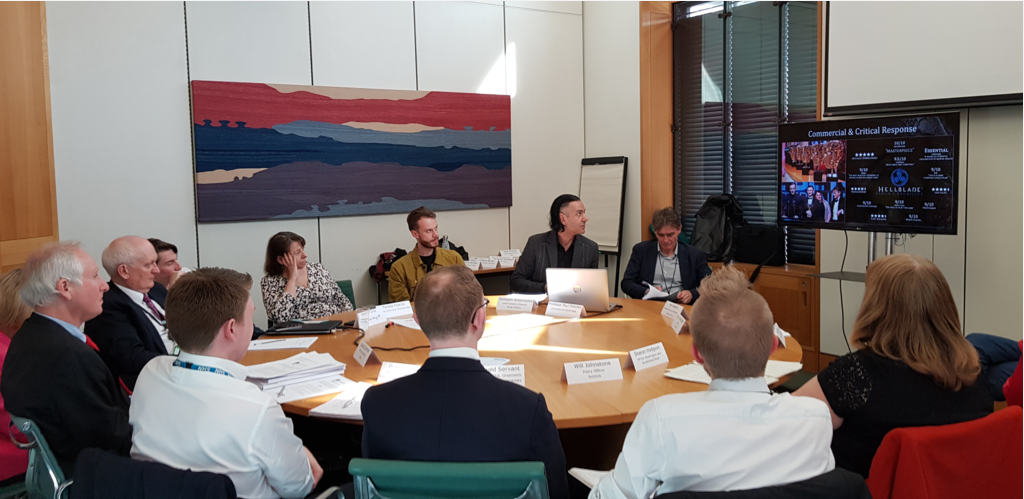Ukie talks to MPs about Games and Mental Health
It’s been an incredible year for what BAFTA have coined “Games Beyond Entertainment”. These games take the power of play and create compelling, immersive experiences that can educate and move their players, start conversations about challenging and delicate subjects, and even collect data for scientific research. On Wednesday afternoon, these games inspired a fantastic session between games industry creators, mental health professionals and seven cross-party MPs.
This roundtable event was held in Westminster to give MPs an understanding of the broader subject areas that games now tackle. More specifically, it explored the themes behind two of the games nominated in the BAFTA Beyond Entertainment category pertaining to mental health. Ukie hosted the event with MPs who sit on the All Party Parliamentary Groups for Video Games and for Mental Health present, though several politicians not sitting on these committees also came along to be part of the discussion.
Tameem Antoniades, Chief Creative Director at Ninja Theory, the studio behind the five BAFTA award-winning game Hellblade: Senua’s Sacrifice, and Professor Paul Fletcher, the University of Cambridge expert in psychosis who provided much of the scientific foundation for Hellblade, kicked off the discussion. Hellblade is played as Senua, a Celtic warrior on a quest to save her lover’s soul. Senua also experiences psychosis – and as you play, you simulate her mental state, hearing not always reliable voices, seeing patterns in your environment and playing the game by a sometimes-delusional set of rules.
Professor Fletcher opened the discussion by saying that fundamentally the impact of this game is in its ability to make mental illness, defined by its invisibility and often its silence, visible and experiential. Ninja Theory have had feedback from players with and without psychosis saying that the game either allowed them to understand the experience of loved ones with psychosis or could be used as a tool to explain to people who haven’t experienced it, what living with psychosis is like. Players with psychosis have also said they felt empowered at seeing their illness represented in a warrior, in a character with ongoing achievements and who is strong and powerful in herself.
We also heard from Max Scott-Slade at Glitchers, developers of Sea Hero Quest, a mobile game that collects data on how you navigate as you play. The data collected, “20,000 years’ worth” from their 3 million players according to Max, is being used by scientists to understand more about the ways the spatial reasoning changes between healthy individuals and those with or developing Alzheimer’s Disease. There are papers in the academic publishing pipeline at the moment that suggest the data collected could allow doctors to identify individuals at risk of demntia 10-15 years earlier while the brain is far healthier and thus more susceptible to treatment. These are significant medical advances. Crucially, they are advances which could not have been made without the ubiquitous UK and international games audience.
It is also important to highlight that Ninja Theory received £300,000 in Wellcome Trust funding for the making of Hellblade: Senua's Sacrifice, which allowed the studio to use researchers such as Professor Fletcher and to engage directly with those who experience psychosis and the voice-hearing community. Ukie CEO Dr Jo Twist used this to highlight to MPs the importance of public institutional funding in creating this, perhaps more commercially risky, but scientifically and culturally high-impact content.
We also had two clinical practitioners from the Royal College of Psychiatrists take part in the discussion, Dr Stephen Kaar and Dr Donald Servant, who added that games don’t have to be about mental health or “for” mental illness to positively impact players. They reported that, though more research is needed in this area, anecdotally they have patients using games of all kinds to self-sooth and socialise.
The response from MPs was overwhelmingly positive – they were impressed by the research and the content of the games themselves. Some of the key points that came out of the discussion included:
- There’s a role for games to play in scientific research while remaining commercially successful – both in collecting data for research (Sea Hero Quest) and making the research accessible and engaging (Hellblade: Senua’s Sacrifice)
- These highly successful, cultural, “beyond entertainment” games were made in the UK and received external funding from the Wellcome Trust. There is an appetite both in the industry and among consumers to make and play these more complex games that address challenging content, but there’s a significant lack of public support available to help make them a reality.
- The sheer breadth of the games market means that games that challenge dominant narratives and/or contribute to important research can reach more people than any other medium. This is an invaluable tool for story-telling.
We would like to say a huge thank you to everyone involved in this event – Glitchers, Ninja Theory and Professor Fletcher, Rethink, Kings College London, The Royal College of Psychiatrists and the Wellcome Trust. We’d also like to thank all the MPs who attended, with particular thanks to Daniel Zeichner MP for chairing the event and his team for their help and to Sharon Hodgson MP (Chair of the APPG for Video Games) and her team.

